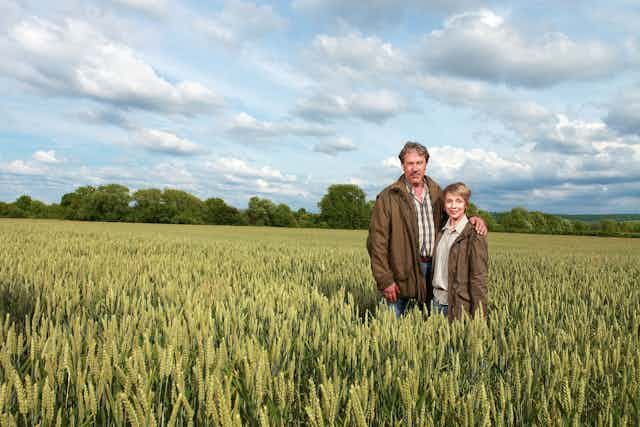The BBC radio serial The Archers is the world’s longest-running soap opera, still thriving after 65 years with an average audience of just under 5m listeners. Recently, the British media has been making rather a lot of fuss about it. The 90% of adults in the UK who don’t listen, to say nothing of the millions across the globe who have never heard of The Archers, might have wondered why a show about rural life in a fictional village somewhere in middle England has been headline news in the country’s press and has trended on Twitter.
Originally established to educate farmers and thus increase food production after the war, The Archers rapidly became a major source of entertainment for urban as well as rural audiences, attracting 9m listeners by 1953. Everyday life in the fictional village of Ambridge, humorous exchanges and the calendar of the farming year have continued to be major elements of a soap opera where drama is played out against this bucolic background. Every spring we visit the lambing shed, while most summers feature a cricket story and a village fête, followed in the autumn by the Flower and Produce show, bonfire night and the Christmas lights.

Despite making some gestures towards the realities of multicultural Britain, The Archers’ version of traditional rural life is the same nostalgic white Englishness that we find in Downton Abbey. Like Downton, the version of the British class system represented here is sentimental and benign. Class hierarchies are clearly demarcated, and at times satirised, but homelessness, unemployment, poverty and loneliness are all resolved by the utopian community. Only in Ambridge would an upper middle-class couple spending the winter in Tuscany offer their boutiqued farmhouse home to a working-class family whose older men are not always on the right side of the law.
If the characters represent a range of age-groups and include manual workers, the audience consists primarily of highly educated middle-class professionals, mostly middle-aged, and mostly women. For many listeners, The Archers has provided a comforting background to their own domestic activities: “It is quite soothing to hear Ruth and David mithering on about badgers on a Sunday morning.” A scriptwriter I interviewed in 2007 confided in me that there is a kind of pact with the audience “not to allow anything too terrible to happen”.
Trouble in paradise
It doesn’t sound like newspaper headline material, does it? It wasn’t, until this pact was broken. The explanation for the recent frenzy of online activity and media attention is the story of Helen and Rob.
Rob is a smooth-talking, middle-class Englishman who needs to control every detail of his wife Helen’s life – what she wears and eats, who she sees and where she goes – or, more often, does not go. He has made her doubt her own sanity, like the heroine of the 1944 film Gaslight that lent its name to this mode of abuse. Their idyllic sounding home – Blossom Hill Cottage – has become associated with a claustrophobic, menacing atmosphere, the setting for a film noir played out through sound. On Sunday April 3 it became a crime scene when in an attempt to defend herself and her son Henry, Helen apparently inflicted multiple stab wounds on her husband Rob.

The intensity of Rob’s abuse of Helen has built up slowly, over months, in the short bursts permitted by this daily 12-minute drama. The script-writers consulted experts in the field and were no doubt aware of the imminent introduction of new provisions in the Serious Crime Act to make coercive control an offence in the UK. Not surprising then that listeners have been inspired to donate more than £100K to domestic violence charity Refuge for the sake of all the “real-life Helens” out there.
The horror of Blossom Hill cottage has broken The Archers’ pact not to go too far into the dark side of English rural life. It has shattered the utopian community. At the same time, the well-established online debates around the programme have intensified, both in their vehemence and in the creativity of the contributions.
Listeners’ online responses to the Rob and Helen story (or the death of favourite character Nigel Pargetter in 2011) express a middle-class investment in The Archers as a quality drama that avoids, or should avoid, the excesses of TV soaps such as Eastenders. They also mobilise the politics of gender in the way that victim-blaming and misogyny have emerged alongside feminist analyses and overwhelming support for domestic violence charities.
The problems of Ambridge can no longer be solved by a piece of lemon drizzle cake or a casserole and, for the listeners, the challenges of the drama and the associated online performance of middle-class cultural capital make for an engaging, but certainly not a comforting, experience. So far the story has attracted new listeners and the faithful fans have turned to social media to calm their shattered nerves. It remains to be seen how the more traditional aspects of the programme can be combined with the courtroom drama that lies ahead – and whether Helen can become as resilient and inspiring as many real-life survivors of abuse.
If anyone has been affected by the storyline, and wants to talk to someone in confidence, then the national domestic violence helpline is an excellent resource. 24 hours, 7 days a week. 0808 2000 247.

